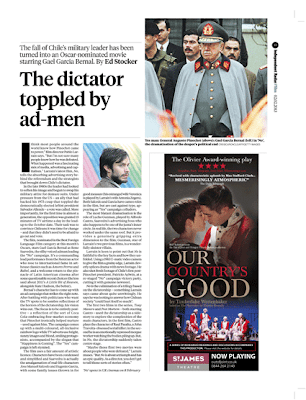The Independent, February 2 2013
The fall of Chile’s military leader has been turned into an Oscar-nominated movie nstarring Gael Garcia Bernal.
The most blatant dramatisation is the role of Lucho Guzman, played by Alfredo Castro, Saavedra’s advertising boss who also happens to be one of the junta’s inner circle. In real life, the two characters never worked under the same roof. But it provides a genuinely gripping extra dimension to the film; Guzman, star of Larrain’s two previous films, is a wonderfully sinister villain.Larrain is keen to point out that No is faithful to the key facts and how they unfolded. Using a 1983 U-matic video camera to give the film a grainy edge, Larrain cleverly splices drama with news footage. He also shot fresh footage of Chile’s first post-Pinochet president, Patricio Aylwin, at a re-staged “No” campaign victory party, cutting it with genuine newsreel
No is the culmination of a trilogy based on the dictatorship – something Larrain says came about quite unwittingly. He says he was looking to answer how Chilean society “could hurt itself so much”.
The first two films in the series, Tony Manero and Post Mortem – both starring Castro – used the dictatorship as a side-story to explore the complexities of the main characters. In the first film, Castro plays the character of Raul Paralta, a John Travolta-obsessed serial killer; in the second he is an emotionally repressed morgue worker watching the bodies piling up. But, in No, the dictatorship suddenly takes centre stage.
“Maybe those first two movies were about people who were defeated,” Larrain muses. “But No is about a triumph and has an epic quality. As a director, you don’t get to tell those sorts of stories often.”
